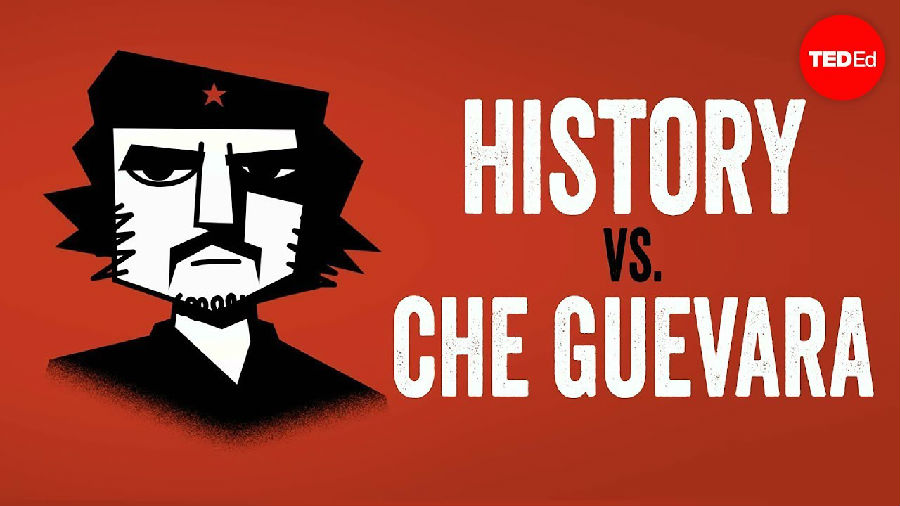(单词翻译:单击)
His face is recognized all over the world.
他的面孔世人皆知。
The young medical student who became a revolutionary icon.
一个年轻医学生变成了革命偶像。
But was Che Guevara a heroic champion of the poor or a ruthless warlord who left a legacy of repression?
但切·格瓦拉到底是穷人的英雄,还是压迫人民的残酷军阀?
Order, order. Hey, where have I seen that guy before?
肃静!肃静!我怎么好像以前见过这个人?
Ahem, your Honor, this is Ernesto Che Guevara.
啊,法官大人,这可是埃内斯托·切·格瓦拉。
In the early 1950s, he left behind a privileged life as a medical student in Argentina to travel through rural Latin America.
在19世纪50年代早期,作为医学生的他放弃了在阿根廷的优越生活,游历了整个拉丁美洲的乡村地区。
The poverty and misery he witnessed convinced him that saving lives required more than medicine.
当地人民贫穷与悲惨的苦况让他坚信,仅靠医学无法拯救生命。
So he became a terrorist seeking to violently overthrow the region's governments. What?
因此,他成了一个恐怖分子,试图通过暴力手段推翻当地政府。什么?
The region's governments were brutal oligarchies.
当地政府是残暴的寡头政治家。
Colonialism may have formally ended, but elites still controlled all the wealth.
虽然殖民主义在当时已宣告结束,但政治高层依然控制着所有的财富。
American corporations bought up land originally seized from indigenous people and used it for profit and export,
美国企业买光了从原住民那里搜刮的土地,用来获利和出口,
even keeping most of it uncultivated while locals starved.
甚至荒废大片土地不耕种,而当地人却忍饥挨饿。
Couldn't they vote to change that?
他们难道不能投票表决改变形势吗?
Oh, they tried, your Honor.
哦,法官大人,他们试过了。
In 1953, Che came to Guatemala under the democratically-elected government of President Arbenz.
1953年,切·格瓦拉来到了危地马拉,该国政府由民选的阿本斯总统领导。
Arbenz passed reforms to redistribute some of this uncultivated land back to the people while compensating the landowners.
阿本斯通过了改革方案,把一些荒废的土地重新分配给人民,与此同时,对土地的拥有者进行赔偿。
But he was overthrown in a CIA-sponsored coup.
但是他被美国中情局支持的一场政变推翻了。
The military was protecting against the seizure of private property and communist takeover.
军政府保护私有财产不被没收以及共产党不执政。
They were protecting corporate profits
他们只是在保护那些美国公司的利益罢了,
and Che saw that they would use the fear of communism to overthrow any government that threatened those profits.
格瓦拉意识到,他们可以利用这种对共产党的恐惧,来推翻任何威胁这些利益的政府。
So he took the lessons of Guatemala with him to Mexico.
所以,他把在危地马拉得到的教训带到墨西哥。
There, he met exiled Cuban revolutionaries and decided to help them liberate their country.
在那里,他见到了流亡的古巴革命家,于是决定帮助他们解放祖国。
You mean help Fidel Castro turn a vibrant Cuba into a dictatorship.
你的意思是帮助菲德尔·卡斯特罗把自由的古巴转变成独裁的国家。
Dictatorship was what Cuba had before the revolution.
古巴经历革命前才是独裁的国家。
Fulgencio Batista was a tyrant who came to power in a military coup.
富尔亨西奥·巴蒂斯塔是个暴君,他通过军事政变掌权。
He turned Havana into a luxury playground for foreigners
他把哈瓦那变成了外国人的豪华游乐场,
while keeping Cubans mired in poverty and killing thousands in police crackdowns.
却让古巴人民陷入贫穷,并通过警力镇压杀戮上千名平民。
Even President Kennedy called it the worst example of "economic colonization, humiliation, and exploitation in the world."
就连肯尼迪总统也将其例举为“世界上最糟糕的经济殖民化、羞辱和剥削。”
Whatever Batista's faults, it can't compare to the totalitarian nightmare Castro would create.
不管巴蒂斯塔有什么过错,总比不上卡斯特罗设立的极权恶梦。

Forced labor camps, torture of prisoners, no freedom to speak or to leave.
劳改营,对囚犯实施酷刑,没有言论自由和出境自由。
But this isn't the trial of Fidel Castro, is it?
但这不是针对菲德尔·卡斯特罗的审讯,对吧?
Che Guevara was instrumental in helping Castro seize power.
切·格瓦拉在帮助卡斯特罗掌权方面举足轻重。
As a commander in his guerilla army, he unleashed a reign of terror across the countryside,
身为游击军队司令官,他在农村开启了恐怖统治,
killing any suspected spies or dissenters.
对疑似间谍的人或持不同政见的人格杀勿论。
He also helped peasants build health clinics and schools, taught them to read, and even recited poetry to them.
他也帮助农民建立诊所和学校,教导他们认字,甚至吟诗给他们听。
His harsh discipline was necessary against a much stronger enemy
严酷纪律是必要的,毕竟他的敌人更加强大,
who didn't hesitate to burn entire villages suspected of aiding the rebels.
那些人能够毫不犹豫地把疑似帮助叛军的村庄付之一炬。
Let's not forget that the new regime held mass executions
但别忘了,新的政权也实行大屠杀,
and killed hundreds of people without trial as soon as they took power in 1959.
在1959年刚取得政权时,他们就未经审讯处决了数百人。
The executed were officials and collaborators who had tormented the masses under Batista.
被处决的都是前任官员和通敌者,他们在巴蒂斯塔政权下折磨大众。
The people supported this revolutionary justice. Which people?
人民也拥护这革命性的正义。什么人民?
An angry mob crying for blood does not a democracy make.
来自一群愤怒暴民的嗜血要求并非民主。
And that's not even mentioning the forced labor camps, arbitrary arrests,
更不用提劳改营,强行拘捕,
and repression of LGBT people that continued long after the revolution.
以及在革命很久后仍继续实行的对同性恋社群的压迫。
There's a reason people kept risking their lives to flee, often with nothing but the clothes on their backs.
人民不断冒着生命危险逃离该国是有原因的,他们逃难时通常都身无分文。
So was that all this Che brought to Cuba? Just another violent dictatorship?
所以格瓦拉给古巴的只有这些?只是另一个暴力的独裁政府?
Not at all. He oversaw land redistribution, helped established universal education,
并非如此。他监督土地的重新分配,帮助设立全民教育,
and organized volunteer literacy brigades that raised Cuba's literacy rate to 96%, still one of the highest in the world.
组织起自愿的教育团队,将古巴的识字率提高到96%,目前仍然是全球识字率最高的国家之一。
Which allowed the government to control what information everyone received.
这让政府能够控制人民接受何种资讯。
Guevara's idealistic incompetence as Finance Minister caused massive drops in productivity
身为财政部长,格瓦拉不切实际,他的无能导致生产力大跌,
when he replaced worker pay raises with moral certificates.
原因是他用模范证书来取代劳工加薪。
He suppressed all press freedom, declaring that newspapers were instruments of the oligarchy.
他也禁止所有的媒体自由,宣称报纸是寡头政府的喉舌。
And it was he who urged Castro to host Soviet nuclear weapons,
也正是他促使卡斯特罗部署苏联核武器,
leading to the Cuban Missile Crisis that brought the world to the brink of destruction.
导致了古巴导弹危机,几乎把世界推向毁灭之路。
He was a leader, not a bureaucrat.
他是个领导,不是个官僚。
That's why he eventually left to spread the revolution abroad. Which didn't go well.
这就是为什么他最后离开古巴,把革命散播到其它国家。但这一行动并不顺利。
He failed to rally rebels in the Congo and went to Bolivia even when the Soviets disapproved.
他未能在刚果号召叛军,之后又不顾苏联反对,跑到玻利维亚。
The Bolivian Government, with the help of the CIA,
玻利维亚政府在中情局的帮助下,
was able to capture and neutralize this terrorist in 1967, before he could do much damage.
在1967年成功抓捕并转化了这帮恐怖分子,阻止他造成更多破坏。
While doing plenty of damage themselves in the process.
但在拘捕过程中,玻利维亚政府也同样造成了大量破坏。
So that was the end of it?
事情就这样完结了吗?
Not at all. As Che said, the revolution is immortal.
完全没有,就如格瓦拉所说,革命是永恒的。
He was publicly mourned in cities all over the world. Not by the Cubans who managed to escape.
全世界许多城市都公开为他哀悼。但并不包括成功逃离古巴的人们。
And his story would inspire young activists for generations to come. Ha.
他的生平继续激励着后世的年轻活动分子。哼。
A trendy symbol of rebellion for those who never had to live under his regime.
对于不曾在他政权下受苦的人来说,他不过是个时髦的叛逆象征。
Symbols of revolution may become commodified, but the idea of a more just world remains.
革命的象征也许变得商业化了,但他那“公正世界”的思想得以保留。
Maybe, but I'm not sharing my coffee.
也许是吧,但我决不和他人共用我的马克杯。
Che Guevara was captured and executed by government forces in Bolivia.
切·格瓦拉遭到了玻利维亚政府军的拘捕和处决。
His remains would not be found for another 30 years.
他的遗体三十年后才被发现。
But did he die a hero or had he already become a villain?
但他究竟是以英雄形象殉身,还是未死就成千古罪人?
And should revolutions be judged by their ideals or their outcomes?
革命究竟应该根据思想还是结果进行评判?
These are the questions we face when we put history on trial.
这些都是我们审视历史时会浮现的疑问。


